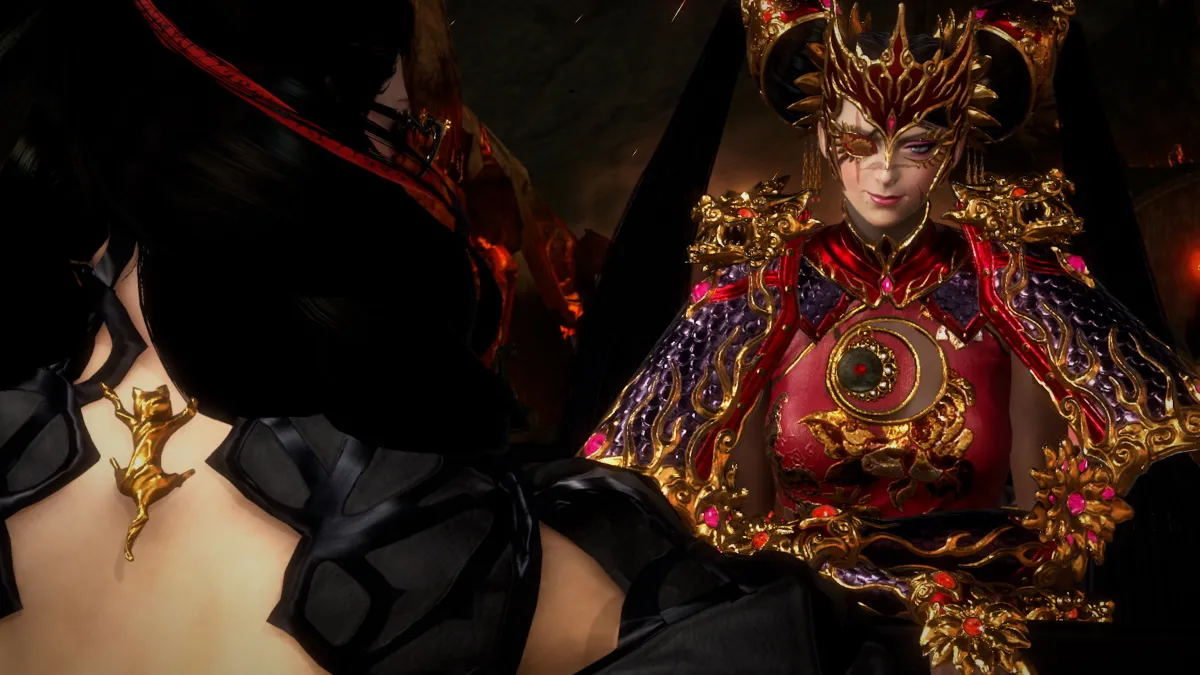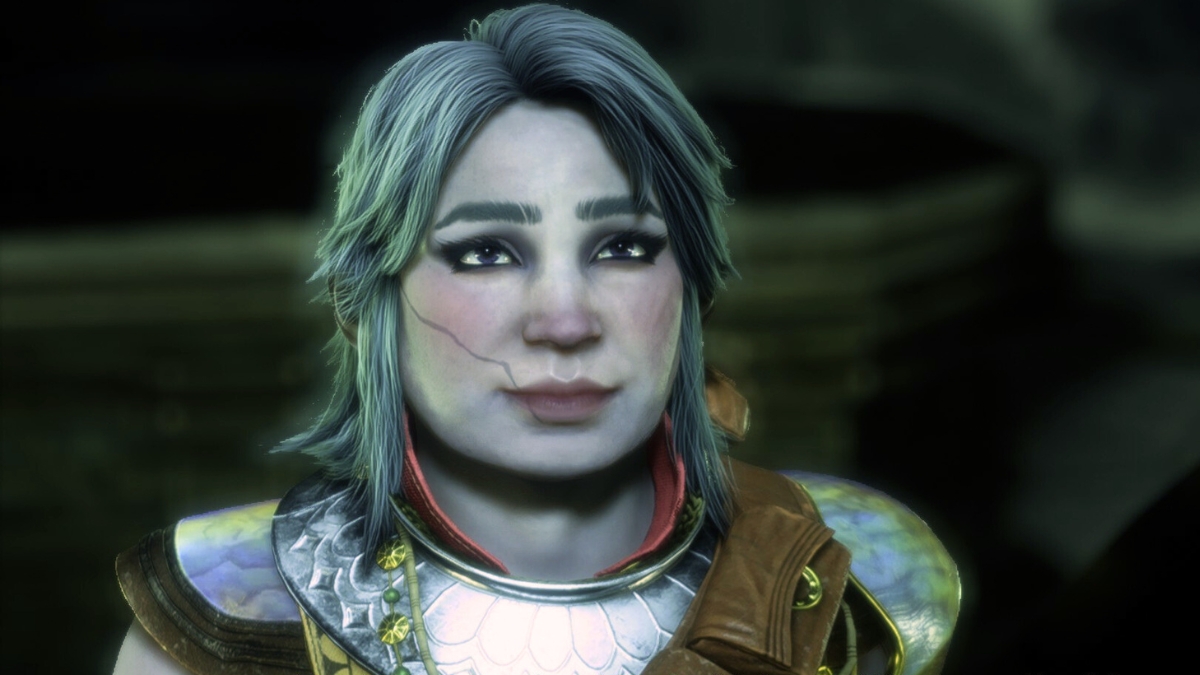I’m going to start this article with a confession: I have never played a Bayonetta game. I’ve always meant to. I even own Bayonetta 2. I just never carved out the time. But this story isn’t a story about the contents of Bayonetta. It’s not a critique. This is about the ever-shifting tones of the social media discourse around Bayonetta 3 in the past few weeks—because a lot has happened around the game, and as nuance has become more and more necessary, that discourse has gotten reactionary.
Before we dig into the present and the bizarre whiplash surrounding two very opposing review styles of the game, let’s start at the beginning. Let us begin with the saga of Bayonetta voice actor Hellena Taylor.
‘Bayonetta 3’ prelude: The Saga of Hellena Taylor
Bayonetta 3 got its first dose of drama on October 15, 2022, when Hellena Taylor, the English voice of the title character, posted a series of videos to Twitter. In them, she says: “The final offer to do the whole game—as a buyout, flat rate—was $4,000.” We ran the full story at the time if you want a run-down on what this moment felt like.
Taylor called for a boycott of the game. She also specifically called out voice actor Jennifer Hale for taking the role, saying she has “no right” to even sign autographs as the character. Calling out Hale was objectively too far—especially as A Woman On The Internet who knows what such an act would (and did) mean.
The boycott, on the other hand, split fans. Some flocked to Taylor’s support and canceled their pre-orders. Others voiced concern that a huge team of people made this game, and they wanted to respect that team’s work. I was neutral—honestly, it felt like a convenient excuse not to play a game I didn’t have time for. But I totally understand the latter concern. It’s a difficult subject to navigate, though: Many people are going to boycott Hogwarts Legacy because of J.K. Rowling’s continuous transphobic statements. Why is that different? Is it because Rowling is at the top of the residuals and ideological food chain for Hogwarts Legacy, whereas Taylor is one of hundreds of creatives involved in Bayonetta‘s process? That would have been a discussion well worth having. It’s the first big one we missed.
But alas, to borrow from The Daily Show, we didn’t have time for it—nor did we have an opportunity to ponder the ramifications of the new wave of creator Hedeki Kamiya’s ever-infamous blocking behavior on Twitter. Because, about a week later, a report came out at Bloomberg that contradicted Taylor’s statement. In the words of reporter Jason Schreier, “Platinum offered Hellena Taylor between $3k and $4k per session for at least 5 sessions.” This report was corroborated by several reliable sources. Schreier also said that, “In an email to Bloomberg, [Taylor] called that version of events an ‘absolute lie’ and said that Platinum is ‘trying to save their ass and the game.’ “
Many were upset with Taylor as the story got more complicated—especially fans who had rushed to her side and cancelled their pre-orders. Predictably, there then came to be a ton of finger-pointing, a lot of shaming, and a lot of accusations of being untruthful. Since Taylor did, indeed, make a point of saying the offer for the “whole game” was $4K, she was technically misleading. But, to me, this new scenario wasn’t that much different. Because in all this, we missed another major important discussion. Because—hey, guys? $15K or $20K to voice the main character in a multi-million dollar franchise is still not nearly enough. But that point—and a larger necessary discussion about paying not only voice actors, but creatives in general, a bigger share of corporate profits—was overshadowed, too.
When Taylor took to Twitter to attempt to rebut the claims, that conversation got actively anti-productive. In the reactionary wave, a type of commenter emerged that acted like $15K is a perfectly reasonable wage. Some sources claimed that Taylor asked for a six-figure salary. This caused more outcry. Yet I fail to see how that’s outlandish, especially when you’re at the bargaining table?? In the emphatic anger of the “You lied!” finger-pointing, I began that age-old though experiment in which I wondered whether the tone of the backlash would be different if Taylor were a man.
It’s not like I think Taylor’s ultimately a misunderstood hero. Hell, one of the “charities” Taylor urged people to support is an anti-abortion group, because everything in this story has to continually get more headache-inducing. Honestly, this saga was making assholes out of absolutely everyone, including anyone who commented on it. I hoped it was, at least, over. Within all this drama, though, some curious numbers came out. Despite the rumblings of a boycott, Bayonetta 3 sales did not go down. They went up. Just … an interesting note.
The next wave: ‘Bayonetta 3’ Review Whiplash
On Tuesday, October 25, reviews for Bayonetta 3 started coming in. And there was a very clear trend: 9/10s or 10/10s pretty much all the way around. “Wow!” I thought. “Maybe I really should play this game, even though the discourse of the last two weeks has made me want to scream!” But then I saw a hugely divergent strain of review, best exemplified by Polygon and The Verge. Divergent enough to give me serious pause. And a headache.
All reviews do agree on the gameplay. They say Bayonetta 3 is a blast to play. They say the combat is the series at its best. Even the Polygon and Verge reviews say that if you only care about fighting, you’ll have a great time. Where the “9/10 reviews” and the Polygon/Verge reviews diverge is the ending. NintendoLife said Bayonetta 3 is “topped off with one of the best … one of the absolutely maddest and goofiest endings to a game we’ve ever seen.” PCGamer celebrates a “truly wild finale, an ending that dares you to ask yourself if you would ever cry over a video game where a lady sticks her middle finger into her motorcycle’s ignition like a key to rev up the engine.” Outlets like IGN say the story is disappointing but it can be overlooked for the combat.
But there’s another viewpoint here. Former TMS senior editor Maddy Myers Polygon says on Polygon, “Unfortunately, Bayonetta 3 ensures that one of the few female characters in a mainstream game who owns her sexuality must pay some sort of tax for the privilege.” After an exploration of the reclamation of female game protagonists that will surely hit with any female gamer, Myers concludes that “Bayonetta was made with Luka in mind.” She also says that the ending was so jarring to her that she immediately uninstalled the game.
Ash Parrish concurs on The Verge: “Suffice it to say, the ending had me like Marlon Brando, tearfully standing over the body of his son in the first Godfather, ‘Look how they massacred my Bayo!’ … There are some incredible leaps of character development that we’re supposed to just take on faith while the game abandons two whole games’ worth of established motivations and relationships all in service to the game’s true villain: compulsory heterosexuality.”
These are lengthy, highly personal laments from two female game critics. That’s what a good review is, in my opinion—personal, and very aware of that. I’m not saying either review take is right or wrong. Everyone is entitled to their opinion, and I’m glad people are enjoying a game they like! As a reporter, though, I have to pause and wonder why there is such a huge gap in perception. Why is this ending a goofy hoot for some and utterly devastating for others? Myers had a very blithe observation of the situation, and it struck me as dead-on.
Not every reviewer who loved Bayonetta 3 was a straight man. Because—and this is true!—no gender or sexual identity is a monolith. I do think Myers was actively brave to post this. It needed to be said, but Twitter is giving her a lot of shit for it. I’ll probably get some of that, too, for this article. Hello! I hope you’re having a nice day!
In the aftermath of this post and these two reviews, I noticed the increasingly toxic Twitter conversation around the game get really nasty and reactive. Both reviewers and anyone who dared to post their viewpoints (including yours truly) are getting accused of not just being flat-out “wrong,” but of being “silly” or “a joke” or, worst of all, lacking knowledge. Even though both Parrish and Myers say in their reviews they’ve been fans of Bayonetta for years. Even though reviews and works of fiction are objective. At the risk of sounding like the internet’s mom, just because you disagree with someone doesn’t mean they’re wrong or uninformed. It reminds me of the “your IQ isn’t high enough to understand Rick and Morty” vibe all over again.
Clearly, there are mountains of complicated configurations of gender perception and equality, female fantasy, sexuality, the place of women in gaming, etc., that are coming to the surface with every angry Tweet, every commenter who skips over or doesn’t take seriously the counterpoint presented by the Polygon and Verge reviews, every space in the perceptional gap between those reviews and the 10/10 ones. But we don’t have time to discuss that right now, do we?
(featured image: Platinum Games)










Published: Oct 28, 2022 11:27 am